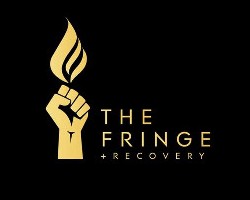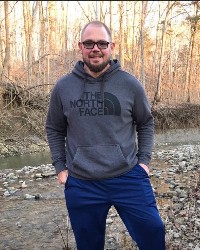On the Road to (Fringe) Recovery: How Dark Paths Can Lead to Brighter Places

James M. Loy, Miami University
There was a time when Tommy Ratliff ‘18 had lost all hope. “I just figured I was destined to end up in the street, and that's where I was going to die,” he says. “In the streets.”
Today, his life is about giving hope to others.
As a Substance Abuse and Mental Illness (SAMI) Clinician for the Butler County Common Pleas Court, Ratliff helps people facing felony charges, often for drug-related crimes, take control of their life.
When they meet, his clients are often spinning in a destructive cycle, seemingly without end. In lieu of a lengthier prison sentence, they arrive at the SAMI program broken and defeated, addicted, and lost. Escape may feel impossible, but there are ways out.

“You see it happen slowly,” Ratliff says. “You watch them become empowered, and start achieving goals they never thought possible. My job is to feed that hope. Because they needed to believe it is possible or they wouldn’t put forth the effort. But I love it when they start running with it, and then they start sharing it, and helping other recovering people who are struggling. That's the most rewarding part.”
Ratliff knows a lot about addiction and recovery. He’s been through it, and he knows what can be achieved. Clean for over eleven years, now full of hope, and eager to pass it on, Ratliff is a recent graduate of Miami University, where he earned a bachelor's and a master's in social work.
He is also the founder of Fringe Recovery, which provides a revamped alternative to traditional 12-step programs.
From the streets, back to college
Ratliff’s story is not only about redemption and recovery. It’s also about the paths that can lead to brighter places. It’s about second chances and finding your true calling.
As a SAMI Clinician, his personal journey is now among his greatest strengths, and Ratliff uses his experiences to connect with those who still struggle. Because like many of his clients, his past is also troubled.
Coming from a rough neighborhood, he, his brother, and his friends were always in trouble. He got sent to an alternative high school and had run-ins with the police. Drug addiction, mental illness, and violence were everywhere.
“Growing up, a lot of people came up thinking that this lifestyle was normal,” he says. “I had a group of friends, and we all kind of raised each other. Selling drugs, leading a local gang, a lot of violence, a lot of mental health problems, a lot of just bad stuff. And as we got older, people started to die. People started to go to prison. Some committed suicide.”
By 16, he had already been incarcerated and through an adolescent drug treatment program.
While on probation, he did well. He met a treatment counselor who would later help inspire his future career. He also finished high school and even enrolled at Miami University in the late 90s. But the change wouldn’t last.
“That's when my addiction really took off,” Ratliff says. “I failed out of school, and just went back to the streets, back to living that life. The same story, same stuff. A lot of violence. A lot of drugs. A lot of problems. Life just kept spiraling out of control, and I was about done.”
The real deciding factor, he says, came in 2008, when he lost his brother to suicide.
“That was it for me. On July 15 of 2008, I went into residential treatment, and went on to sober living, and I haven't looked back. This is where I began the internal work needed for the profound changes needed in my life. When I got out of treatment, I worked for the Laborer’s Union for 5 years. During a winter lay-off, I went for my calling and went back to college.”
The road to Fringe Recovery
“I'm real grateful for Miami allowing me to come back,” Ratliff says. “I wasn’t sure if I’d fit in, being older. Dr. [Sharon] Custer had the largest impact on me. Every time I talk to her, I tell her ‘thank you’ for everything she’s done. She was always real supportive. I wasn’t sure I was in the right field because of my different beliefs and life experience. During a time of doubt, Dr. Custer told me, ‘You belong here. We need people like you in social work.’”
“I now know I'm right where I'm supposed to be,” he says.
Alongside his work with the Butler County Common Pleas Court, Ratliff is also an active community volunteer. In the past, he’s also hosted Alcoholics Anonymous (AA) and Narcotics Anonymous (NA) meetings at Butler County Jail and the Community Correctional Center in Lebanon, Ohio.
“I did that for years,” he says. “Because it was in Butler County Jail when I first heard the message of recovery. So I felt driven to bring meetings to the inmates, to answer questions, and to get them to see the light while they were not under the influence.”
More recently, Ratliff started Fringe Recovery, which provides open discussions and therapeutic activities. The goal is to provide support to anyone seeking an alternative to traditional 12-step programs like AA and NA.
 “AA and NA have helped many millions of people, and they helped me,” Ratliff says. “But those programs draw a hard line on total abstinence and maintenance medications. Many of my clients didn't fit into that category. So I wanted to start a support group more focused on tolerance and acceptance, and just being supportive. Come one, come all. We are going to talk, and talk openly, and there’s no judgment.”
“AA and NA have helped many millions of people, and they helped me,” Ratliff says. “But those programs draw a hard line on total abstinence and maintenance medications. Many of my clients didn't fit into that category. So I wanted to start a support group more focused on tolerance and acceptance, and just being supportive. Come one, come all. We are going to talk, and talk openly, and there’s no judgment.”
This is all part of a larger mission to bring hope to more people, especially those still struggling to get through their own dark journey.
“You don't have to wait until you go to prison, or until people close to you pass away, to learn from those that have come before you, and made it out alive,” Ratliff says. “They don't have to go through the same mistakes.”
“Yes, it's work,” he continues. “A lot of recovery is about growing up. It's about taking responsibility for your actions, learning how to process feelings, and understanding that life is not about feeling good all the time. But if you do the work, the work suggested by counselors and from others in recovery, I can assure you that things will get better.”

